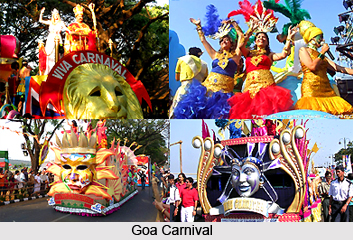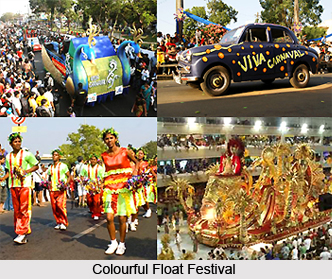Carnival in Goa is the most famous festival in the state. These three days of celebration is marked by extravaganza, of fun, frolic and merry-making. The carnival takes place in the month of February.
The word Carnival (Carnaval in Portuguese) is derived from a Latin word meaning `to take away meat.` It is an expression of the 40-day period of fasting of Lent, during which consuming from meat must be abstained. The Carnival festival in Goa has been celebrated since the 18th century as a precursor to the abstinence of Lent. The celebration of `Carnival` is exclusive and unique to Goa. It was introduced by the Portuguese who ruled over Goa for over five hundred years.
The history of the Goan carnival dates back to about 500 years. Although introduce by the Portuguese, the trend of celebrating the Carnival with much enthusiasm goes back to ancient Rome and Greece. The Portuguese when came to know about this colourful festival they felt it to be very amusing. Hence when they established their colony in Goa they introduced the festival here. Since then, the carnival is celebrated with pomp and show every year in Goa.
 Just before Easter Sunday, all Goans celebrate the carnival as a feasting and merry making time. For three days and nights the streets come alive with colour. During this time huge colourful parades are organised with bands, floats and dances, while the evenings mean serious partying. The parades are accompanied by the strumming of guitars, graceful dances and of non-stop festivity. The final day`s festivities conclude with the famous red-and-black dance held by the Club National in Panaji.
Just before Easter Sunday, all Goans celebrate the carnival as a feasting and merry making time. For three days and nights the streets come alive with colour. During this time huge colourful parades are organised with bands, floats and dances, while the evenings mean serious partying. The parades are accompanied by the strumming of guitars, graceful dances and of non-stop festivity. The final day`s festivities conclude with the famous red-and-black dance held by the Club National in Panaji.
The float parades are organised in association with the State Tourism Department. The float parade in Panaji is led by a special float hosting King Momo. Each year the legendary king Momo takes over the state and the streets come alive with Music and colour. It is usually a specially decorated float. Although, the three-day festival is primarily celebrated by the Christians, it has also absorbed the Hindu tradition revelry, western dance forms and has thus turned into a pageantry of sorts.
 The festivals had begun as a celebration rejoiced only by the local population; it has today crossed the state boundaries and has engulfed thousands of people from all over the country.
The festivals had begun as a celebration rejoiced only by the local population; it has today crossed the state boundaries and has engulfed thousands of people from all over the country.
The carnival is meant to be a feasting-drinking-merrymaking orgy celebrated before 40 days of Lent. Among the many and various colourful feasts and festivals that are celebrated in Goa, the Goa Carnival is the most eagerly awaited event.
The carnival is not celebrated anywhere else in India and was in decline even in Goa in the last few years of Portuguese rule. Its revival with the liberation of Goa, and a boost to its tourism was therefore welcome. From being almost on the brink of decline, this three day festival of riotous revelry now attracts thousands of tourists to Goa from all over India every year.



















